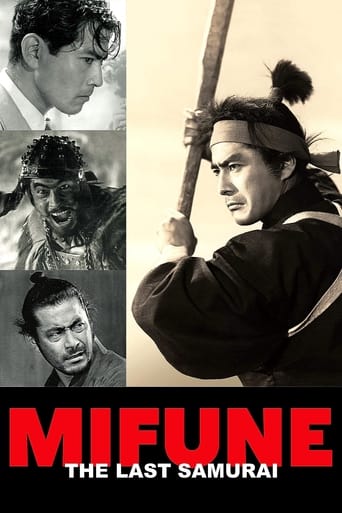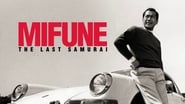masonfisk
A Cliff Notes type look at the volcanic thespian that was Toshiro Mifune whose collaboration w/Akira Kurasawa rivals other actor/director relationships like Bogart/Huston & DeNiro/Scorsese. We get the usual boilerplate of timeline from his early days as an actor to the bullet points of film roles which defined his career. I wish the filmmaker delved deeper but as said in the doc, he was a very private man so what we have is a good entryway to this marvelous talent.
Aleksandar Sarkic
Toshiro Mifune is one of my favorite Japanese actor. He and Akira Kurosawa changed Japanese cinema for all times and also influenced a lot a whole world cinema. When i saw that they are making a documentary about Mifune i was so happy, and finally i had a opportunity to watch it. It is okay documentary but something is missing, it feels somehow empty. I think they put a lot of talking about known movies like Seven Samurai, Yojimbo and Rashomon. It is a shame but they not talk about such great Mifune- Kurosawa collaborations like The Bad Sleep Well and High and Low. Mifune was so great in his roles in drama movies, even better than in samurai ones. Also his private life is not mentioned, okay we only got information he was an avid drinker and loved sport cars and driving, but other things not. Maybe the answer is privacy in Japanese culture, and Mifune himself was very closed person in private life. The guests who are talking about Mifune are generally okay, but were is Tatsuya Nakadai, he acted in so many movies together with Mifune like Sanjuro, Yojimbo, Samurai Rebellion, Sword Of Doom, High And Low, it would be interesting to hear his experiences acting alongside Mifune, also for foreign guests it is okay they have called Spielberg and Scorsese, but where is George Lucas, Lucas was so influenced by Mifune, even he wanted to gave a role of Obi wan Kenobi to Mifune, and Hidden Fortress influenced Star Wars a lot, so i think the director missed some better guests, but on other hand it is nice he called Shiro Mifune to talk about his father that is big plus tome. Generally i enjoyed watching it because i was always interested in Japanese cinema but as i said earlier it can be better. If you are fan of Toshiro Mifune, Kurosawa and old Japanese cinema watch it for sure, you will not regret it.
bernardoarquivo
I waited anxiously to watch Steven Okazaki's documentary about the greatest Japanese actor of the twentieth century, Toshiro Mifune. It had all the elements and resources to be excellent. Okazaki had the rare privilege of interviewing the eldest sons of both Mifune and Kurosawa, as well as actors and actresses who worked with Mifune. He had access to TOHO's archives and Kurosawa's and Mifune's families private collection. Spielberg and Scorsese gave testimonials about the influence of the actor in American cinema. And with all that, I was utterly disappointed with it.The documentary clocks in under 80 minutes to tell the story of an actor who made hundreds of films and influenced a century of different generations of actors from around the world. The testimonials are superficial, precious sources are wasted and long minutes are spent on side stories that have nothing to do with Mifune. Of the actor's eighteen films with Kurosawa, Okazaki chose four or five to detail and nothing was said that has not already been known to exhaustion by any movie buff. Even the chosen scenes are wrong. When the subject is Rashōmon or Shichinin no Samurai, no spoken scenes are shown, of Mifune. None. When we get to Kumonosu-jō, a whole sequence is spent for a supporting actor to reminisce of his own scene, and another one is to let us know that the extraordinary arrows scene was filmed without Kurosawa having made any life insurance for the actors. Very interesting. As detail. But nothing more is said about this exquisite work by Mifune and Isuzu Yamada. Actresses such as Kyôko Kagawa and Yôko Tsukasa, who worked several times with Mifune and could have told fantastic stories of both his creative process and his idiosyncrasies, remained in the shallow, in the anecdote. Director's fault.It is remembered that "The Magnificent Seven" is a remake of Shichinin no Samurai and that "A Fistful of Dollars" is a remake of Yojimbo. But not a word is said about "The Outrage," directed by Martin Ritt in 1964, being a remake of Rashōmon with Paul Newman and Claire Bloom. No new insight into Mifune and Kurosawa's breakup. And once the partnership is over, Okazaki rushes it to the end, even though Mifune had at least twenty years of active life in films and television after his last work with Kurosawa.For the nerd audience, George Lucas is an unforgivable (and inexplicable) absence, since it is known and confirmed the influence that Kakushi-toride no san-akunin, of 1958, had on the whole conception of the Star Wars saga. Also known is the fact that Mifune was asked to play Obi-Wan Kenobi and turned it down on the advice of his dorky business manager. It is said in Star Wars trivia that even Darth Vader's helmet was based on Mifune's helmets in his samurai films.Moreover, not a single Mifune interview. No TV shows, no attendance at awards or events. Mifune was a withdrawn and private man. It would have been invaluable to see him talk about his own life and career. Deconstruct the myth and show his humanity. The director should have panned out every scene in which Mifune offered a piece to help unravel the puzzle of his personality. As it was edited, the documentary is about an eighteenth-century figure. There are no voice records, there are no quotes or statements.It's a pity.
jakob13
We owe a debt of gratitude to Steve Okazaki, an American film maker of Japanese ancestry, for recalling the magnetic Japanese film star Toshiro Mifune, who in collaboration principally but not exclusively with Akira Kurozawa, during 16 years of a frenetic, fecund period of Japanese cinema that left his indelible mark on world cinema. Okazaki cleverly kept his camera on Mifune as samurai, the last samurai, which is slightly misleading. The decline of rerun houses and Japanese film retrospectives may have dimmed the memory of an extraordinary actor. Mifune was an outsider, a fact few know. He was born in China, in Dalian. At 20, he first came to Japan for military service, not welcome but treated as second class. He kept his counsel, cultivated a quiet patience and persevered. In fact, an actor of the Golden Age of Japanese cinema, thought of only one word that defined Mifune: perseverance, a steadfastness ignoring difficulties in achieving success. Other actors spoke of his tenacity, his gambatte spirit, but also of his generosity and kindness. At first he had a limited vision of a career: a camera man, but Kurozawa saw something in him as an actor. And the rest, as they say is history. But Mifune's eyes, they had a hypnotic effect. They had a beam, a spark of something special, something god-like, if you will, that on screen the spectator knew he was in the presence of a talent that enchanted him. An actor whom his directors left alone to develop his character, and they were not wrong, for Mifune gave his all to his samurai and dramatic roles that so quickly resonated in his fans inner being. You only have to think of his peasant who wanted to become a warrior in 'Seven Samurai' or the gruff, quick thinking general in 'Hidden Fortress' or his wily 'Yojimbo' or his subtle portrayal in 'Red Beard',where without a sword he prevails. And then there's his portrayal of Kurozawa' adaptation of 'Macbeth', 'Throne of Blood' where real arrows were used to kill the usurper he portrays, and his costar Isusu Yamada as a spellbinding Noh like Lady Macbeth. Okazaki mentions but slights the broader acting skills of Mifune, with the great Takashi Imamura. Look again at 'High and Low', 'The Bad Sleep Well', 'Lower Depths' and the less great Kurozawa's version of Dostoevski's 'The Idiot' with the legendary Sestsko Hara. As the quintessential samurai, Mifune gained an international reputation and following. (What greater homage could be paid by Alain Delon in Melville's 'le samourai'). In later life, as head of a production company,he made and played endless endlessly the samurai. Never one to shirk responsibility, he brought his samurai into television as cinema waned. But age and the burden of keeping his emotions pent up, had its toll in heavy drinking and fast cars and scandal which broke up his marriage. And then alzheimer claimed him and he died at 77 in 1997. Now gone these almost 20 years, Okazaki brought him back to us and it is hoped to a younger generation of film enthusiasts who could do no better than to see Mifune's films.




